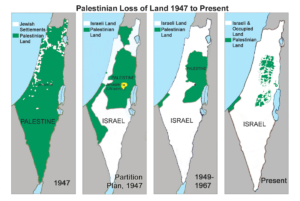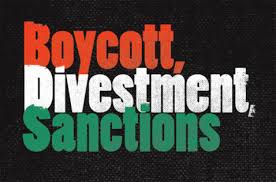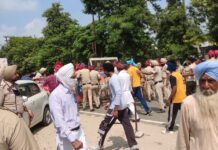This is a two part series on Palestine. Part 1 can be found here
In the previous part of this series on Palestine, Nakba and the Palestinian Boycott, Divestment and Sanctions movement, we looked at the history of Israel’s apartheid, colonization and occupation of Palestine, and the popular resistance mounted by Palestinians in the face of such egregious violations of their human rights. In the second part of this series, we will look closely at India’s relationship with Palestine- the collaboration between the regimes of India and Israel, and the people’s resistance that is growing against it.
Historically, India upheld a strong commitment to supporting the Palestinian freedom struggle. Its roots lied in the commonality of anti-colonial struggles. While India won its independence from British rule in 1947, Palestinians suffered the Nakba in 1948- the mass expulsions and ethnic cleansing of Palestinians to establish the state of Israel. Government of India had declared 3 days of mourning on the passing of Palestinian Liberation Organization Chairman, Yasser Arafat, in 2004, whom we all remember as a friend of India. Indians could not get a visa to travel to Israel and apartheid South Africa until 1992- an act that is testimony to our commitment to human rights. This postage stamp, issued on the UN observance of International Day of Solidarity with the Palestinian People in 1981 sums up the story of India’s support to Palestine, a story that has fast changed and become unrecognizable.

While this solidarity had started to erode in the 90s, when India opened trade and diplomatic relations, especially pivoted on arms purchase, these ties were covert. Under the NDA regimes, and especially with Narendra Modi at the helm of affairs, the alliance with Israel has become brazen and is being valourized by the ruling regime and its supporters. The basis of this, obviously, is the ideological affinity between the ruling right-wing regime in India and Israel. BJP and Sangh Parivar’s Hindutva are a mirror image of Zionism in their supremacist, exclusivist ideologies. And it is this that brings Modi and Netanyahu together.
Israel has a government to government agreement with India, wherein Israeli agriculture corporations as well as projects are promoted as the panacea for our agrarian crisis. Especially in Karnataka, the state government has been spending hundreds of crores of rupees on ‘Israeli agriculture technology’, the results of which we are yet to see. Israeli corporation Netafim, which is involved in serving illegal Israeli settlements, has been incorporated in state subsidy schemes and is running projects that have previously understood to be detrimental to Indian farmers and as well as are selling expensive drip irrigation equipment in India. India’s film industry is increasing its collaboration with Israel, as part of another government agreement, helping whitewash Israel’s crimes.

The most pernicious aspect of India’s ties with Israel is the military and security ties between the two. In the last years, India has bought nearly 50% of Israel’s weapons exports. The weapons Israel sells are promoted as ‘field tested’, implying that they have been used to kill or main Palestinians. Buying Israeli arms directly finances its military occupation of Palestine, and India is among the top states complicit in this egregious violation. In return, weapons and technology bought from Israel further militarize our society and entrench state repression. Most obviously, these methodologies are used to crush Kashmiri political struggles and commit gross human rights violations. India has also entered security agreements on counterterrorism, cybersecurity and police training with Israel. Every year, batches from the IPS academy in Hyderabad visit Israel as part of their training. It is not by chance that the sniper who killed protesters in Thoothukudi last year was as well trained in Israel. This is not to claim that Israel is the reason for growing state repression, but rather it provides an edge to already existing structures and systemic violence.
Earlier this year, in the context of escalated tensions between India and Pakistan, the bombs that India dropped in Balakot, Pakistan, were of Israeli make. During the election campaign for 2019 Lok Sabha elections, Amit Shah, the party president of the BJP glorified India’s actions in how they bring India in the league of states like the US and Israel which enter enemy territories and attack. Riding on the wave of hyper nationalism, the has BJP won a second term. In this phase, India under Modi is expected to further deepen its ties with Israel.

In the face of these escalating ties of complicity, conscientious individuals and organizations are joining and building the Palestinian led Boycott, Divestment and Sanctions movement. The movement, led by Palestinian civil society, aims to pressurize Israel to comply with international law and respect Palestinian human rights through non-violent tactics, inspired by the anti-apartheid struggle of South Africa. In India, farmers organizations are leading the campaign against Netafim, artists and academics are coming together to oppose Israel’s whitewashing of its oppression by cynical use of art and culture. We are asking the Hindi film industry to not be a tool for covering up apartheid. Movements in global south are building common struggles against militarism in their contexts and for a comprehensive military embargo on Israel. Students in India are also a part of the global campaign against Hewlett Packard, the IT company that supports Israel’s apartheid, occupation and settler-colonialism.
In today’s context, when right wing populism is on the rise globally and we are ourselves have seen Hindutva majoritarianism sweep the general elections, the struggle for Palestinian freedom is linked to own struggles for democracy, justice and secularism. In each instance, standing with Palestine is also standing for the values we cherish and are defending. Our silence only makes India’s complicity with Israel deeper, and further entrenches our own move towards becoming another Israel. Collective struggles, by building the BDS movement, is the most effective way forward from here.



























[…] Also read: Palestine and India : The necessary road to Solidarity […]